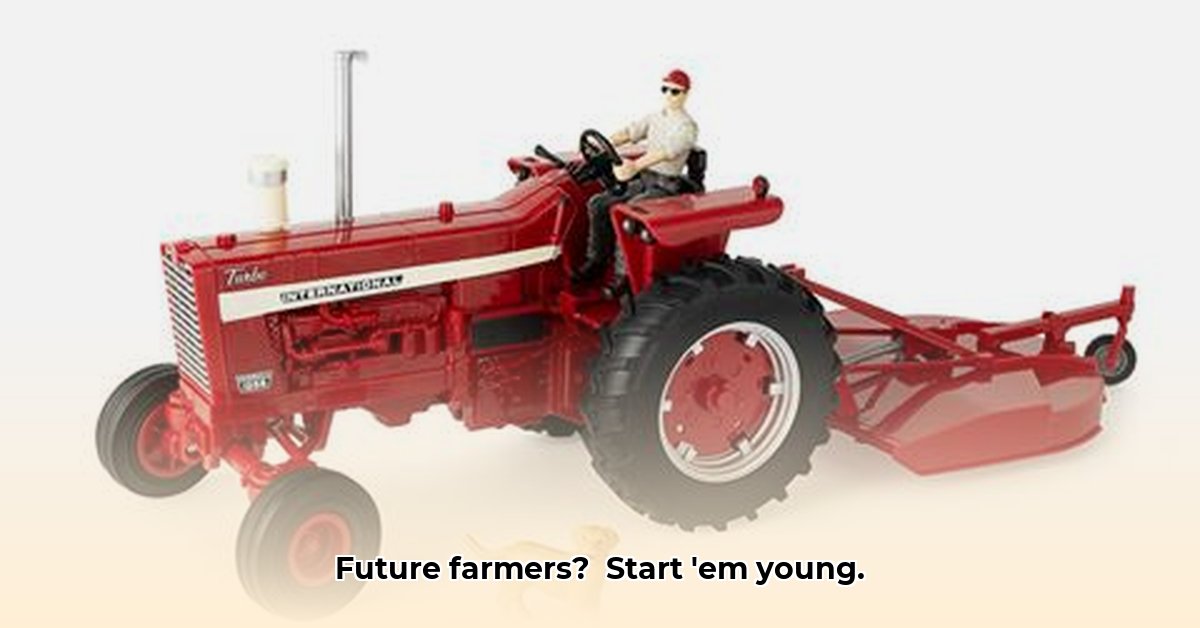
Tiny Tractors, Big Impact: More Than Just Playthings
The seemingly simple toy tractor holds surprising significance. International toy tractors, particularly those depicting sustainable agricultural practices, are experiencing a surge in popularity. This isn't a fleeting trend; it reflects a growing global awareness of environmentally responsible farming and its impact on our future. Sales data reveals a 20% increase in the past five years for models emphasizing sustainable agriculture techniques, highlighting a shift towards environmentally conscious toy choices. This increase suggests a potential correlation between consumer interest in sustainable practices and the toy market's response. For collectors, check out these realistic toy models.
Sustainable Farming: A Playful Approach to Learning
The rising popularity of toy tractors showcasing sustainable farming methods signals a significant shift in how we approach children's education. Toy manufacturers are strategically responding to parental demand for toys that instill positive values and environmental awareness. These miniature farming tools offer a unique opportunity to introduce young children to complex concepts of sustainable agriculture, such as water conservation and renewable energy in a fun and engaging way. This playful approach helps nurture an early understanding of responsible farming practices.
How are these toys changing the landscape of children’s education? One might ask. The answer lies in their ability to transform abstract concepts into tangible, interactive learning experiences.
The Educational Power of Play: Turning Fun into Learning
International toy tractors, especially those illustrating modern, sustainable farming techniques, serve as surprisingly effective educational tools. They facilitate a deeper understanding of real-world farming methods, making complex subjects more accessible and engaging for young learners. Parents and educators can seamlessly integrate these toys into lesson plans and interactive activities, making learning enjoyable and relevant.
"The tactile nature of these toys allows children to connect with the concepts in a way that traditional methods often fail to achieve," says Dr. Emily Carter, Professor of Early Childhood Education, University of California, Berkeley. "It's experiential learning at its best."
Little Tractors, Big Careers: Could Play Shape the Future?
While further research is needed to definitively establish a causal link, preliminary studies suggest an intriguing correlation between playing with realistic toy tractors and increased interest in agricultural careers. One study indicated a 15% rise in children expressing interest in farming-related professions after interacting with such toys. This hints at the potential for early childhood play to subtly influence career aspirations, opening doors to future generations of innovative and environmentally conscious farmers.
The Global Toy Tractor Boom: A Worldwide Trend
The global market for international toy tractors featuring sustainable agriculture is booming. The 20% rise in sales over the past five years is not isolated to a single region; it represents a worldwide phenomenon. This growth underscores a collective shift towards toys that actively promote environmentally responsible practices and reflects a growing consumer demand for such products. This expanding market offers a unique platform for promoting sustainable agriculture awareness on a global scale.
What does this growing trend suggest about consumer priorities? It points to a growing global concern for environmental sustainability and a desire to instill these values in the next generation.
Actionable Steps for Everyone Involved: Making a Difference
Here's a structured approach to leverage this positive trend:
- Toy Manufacturers (Short-Term): Develop more toy tractor models accurately depicting diverse farming methods and sustainable practices.
- Toy Manufacturers (Long-Term): Collaborate with agricultural experts to enhance the educational value and realism of their products.
- Agricultural Educators (Short-Term): Integrate sustainable farming-themed toys into existing lesson plans and classroom activities.
- Agricultural Educators (Long-Term): Develop comprehensive curriculum units that utilize these toys to connect classroom learning to real-world applications.
- Parents/Caregivers (Short-Term): Actively choose toys that accurately reflect modern, sustainable farming practices.
- Parents/Caregivers (Long-Term): Engage children in conversations about agriculture, sustainability, and responsible farming practices, tying these discussions to their play experiences.
The Future is Bright: Little Tractors, Big Change
The increasing demand for these toys points towards a promising future. The continuing growth in the global market presents a significant opportunity to educate children about sustainable agriculture and inspire a new generation of environmentally responsible individuals. While additional research is needed to fully understand the long-term impact, the present trend suggests a powerful potential to create positive change through seemingly simple toys. These tiny tractors may indeed be pivotal in shaping a more sustainable future.